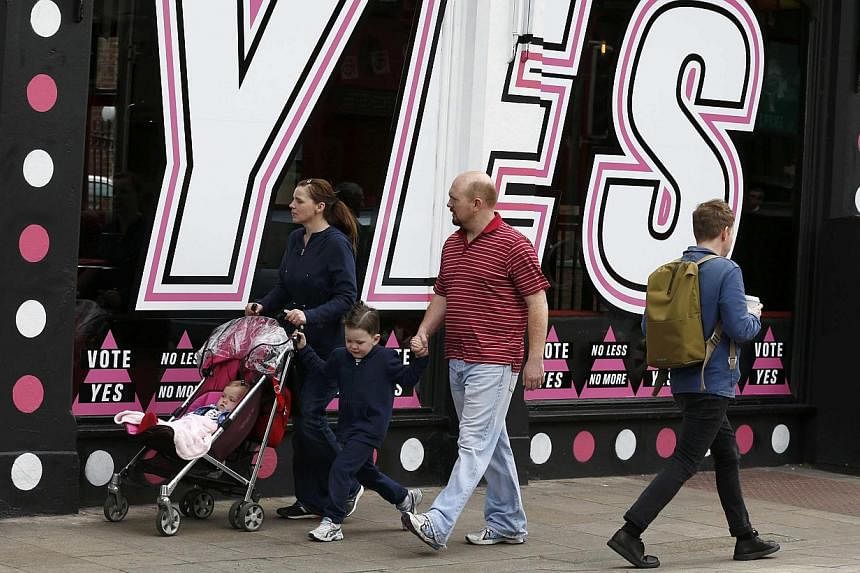DUBLIN (AFP) - Turnout was reported to be high in Ireland's referendum on Friday on whether same-sex marriage should become legal, a vote which has exposed deep divisions in the traditionally Catholic nation.
Allowing gay couples to wed would be a seismic change in a country where homosexuality was illegal until 1993, and where abortion remains against the law except where the mother's life is in danger.
State broadcaster RTE said polling stations were recording a higher turnout than usual for referendums, with voting levels in some areas predicted to top 60 per cent, more comparable with that witnessed at general elections.
Voters had until 10pm on Friday (5am on Saturday in Singapore) to cast their ballots, with the result expected on Saturday afternoon.
"It's a very historic day, for Ireland, for gay people and for their family and for their friends, and for the future of the country," said Seamus Wright, who went to vote in central Dublin with his partner John O'Sullivan.
"Today, in fact, is our first anniversary of our civil partnership and we hope it's our last anniversary as well because we would like to get married," he told AFP.
At a polling station in the south Dublin suburb of Milltown, Rachael Stanley, 60, said she voted "No" and felt "strongly about it".
"This is about children. It's far too radical a step. I want to protect marriage and the stability of children," she told AFP.
"I hope I don't get tarred and feathered for saying that," she added.
CHURCH'S HISTORIC INFLUENCE
If the move is approved and the ensuing legislation is passed, Ireland would become the first country to make the change following a popular vote.
Referendums in Croatia and Slovenia both resulted in "No" votes, although Slovenia's parliament went ahead and approved gay marriage in March.
"We are saying here, in a world first, that the people of Ireland can extend the right of civil marriage to all our citizens," Prime Minister Enda Kenny said this week.
Kenny voted at a school in County Mayo on the west coast, while President Michael D. Higgins cast his ballot in a hospital in Dublin's Phoenix Park.
Ireland would be the 19th country in the world to legalise gay marriage and the 14th in Europe if the referendum passes.
Across the border in Northern Ireland, gay marriage is banned even though it is legal in the rest of the United Kingdom.
All Ireland's main political parties, including conservatives, support amending the constitutional definition of marriage, and the final polls put their camp comfortably in the lead.
The result is by no means certain - the Catholic Church has campaigned strongly for a "No" vote, and many older and rural voters agree with the clergy.
The majority of Irish people identify themselves as Catholic, although the Church's influence has waned amid growing secularisation and after a wave of child sex abuse scandals that badly discredited the hierarchy.
HEATED CAMPAIGN
Voters living abroad have been travelling home to have their say in the referendum.
A group of around 30 Irish living in London arrived on the ferry into Dublin in high spirits, carrying banners and balloons and singing Elton John's hit Are You Ready For Love.
"For my numerous friends who are in the gay community, I felt it was very important that I added to the 'Yes' vote. I want to live in a country that values equality," said broadcast journalist Sarah Duffy, 27, before rushing off to vote.
Voters are being asked whether or not to add an article to the Irish constitution saying: "Marriage may be contracted in accordance with law by two persons without distinction as to their sex."
Around Dublin, lamp-posts were festooned with placards for the "Yes" and "No" camps.
On the main thoroughfare, O'Connell Street, a giant "Yes" banner hung down above an amusement arcade, reading: "Vote Yes because marriage matters."
But there were also placards reading "Don't be silenced. Vote No", and "Two men can't replace a mother's love".
The "Yes" side has been boosted by the support of sports, music and film stars including Irish Hollywood A-lister Colin Farrell.
Irish rock band U2 posted a social media picture of a handwritten note reading "In the name of love... vote Yes".

